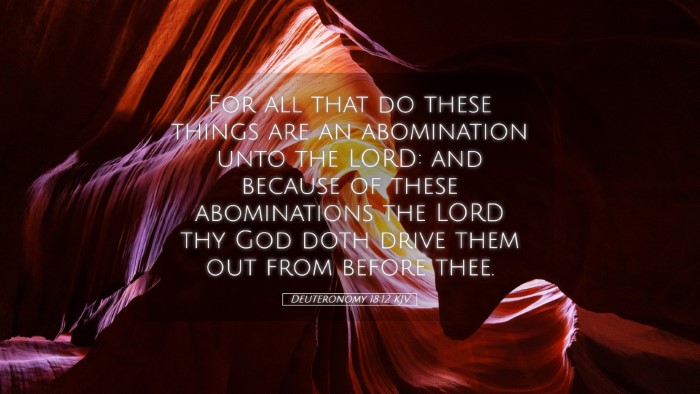Commentary on Deuteronomy 18:12
Verse Context: Deuteronomy 18:12 states, "For all that do these things are an abomination unto the LORD: and because of these abominations the LORD thy God doth drive them out from before thee." This verse forms part of a larger discourse regarding the laws governing Israel and their distinction from surrounding nations.
Introduction
This commentary seeks to explore the implications and theological significance of Deuteronomy 18:12, drawing insights from venerable biblical scholars like Matthew Henry, Albert Barnes, and Adam Clarke. This text warns against practices considered abhorrent to God, highlighting God's standards for His people and the necessary separation from pagan customs.
Contextual Analysis
Historical Context: In Deuteronomy, Moses prepares the Israelites for their entry into the Promised Land, emphasizing the need for holiness and adherence to God’s commandments. The admonition against practices like sorcery, divination, and witchcraft illustrates the stark distinction between the worship of Yahweh and the rituals of Canaanite religions.
Literary Context: Deuteronomy 18:12 is situated within a broader section warning against pagan customs. The repetition of God's disapproval underscores that these practices lead to spiritual corruption, affecting not just individuals but the community at large.
Theological Implications
Divine Standards: Matthew Henry emphasizes that God’s laws reflect His holiness. The practices mentioned in this verse are not merely cultural but are fundamentally opposed to God’s nature. Henry remarks that God desires His people to be holy, echoing the call for moral integrity and faithfulness.
The Nature of Abominations: Albert Barnes points out that the term "abomination" denotes a strong aversion on God's part to sin. Practices such as divination and necromancy manipulate the spiritual realm in ways that contravene God’s created order. Barnes highlights that God’s detestation of these acts is grounded in His desire for His people to seek truth and guidance solely from Him.
Separation from Sin: Adam Clarke draws attention to the need for Israel to remain separate from other nations. The underlying principle is that attachment to these pagan rituals can lead to idolatry and consequently, divine judgment. Clarke emphasizes the dangers of syncretism, urging believers to uphold their distinct covenant relationship with God.
Practical Applications
Modern Relevance: The warning in Deuteronomy 18:12 is not just historical but carries weight for contemporary believers. It challenges modern Christians to examine their own practices and beliefs, ensuring that they align with God’s commands without succumbing to cultural pressures or secular ideologies.
- Identifying Modern Abominations: Just as ancient Israel had to discern unacceptable practices, today’s believers must critically assess influences in their lives that conflict with Biblical teachings.
- Seeking True Guidance: This verse encourages seeking God for wisdom rather than succumbing to the allure of mysticism or secular philosophies that offer deceptive promises of enlightenment.
- Cultivating Holiness: The call for holiness remains pertinent; believers are encouraged to cultivate lives marked by purity, righteousness, and obedience to God’s word.
Conclusion
Deuteronomy 18:12 serves as a profound reminder of the necessity for God's people to live in accordance with His standards, rejecting practices that are abominable to Him. As articulated by Henry, Barnes, and Clarke, the theological and practical lessons derived from this verse stress the importance of remaining faithful to God in a world filled with competing spiritual voices. Believers are called to uphold their identity as God's chosen people, marked by a life that seeks His wisdom, righteousness, and holiness.


